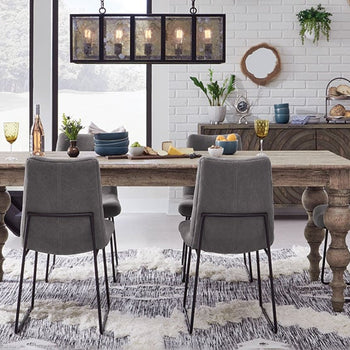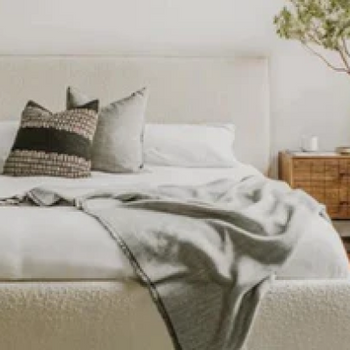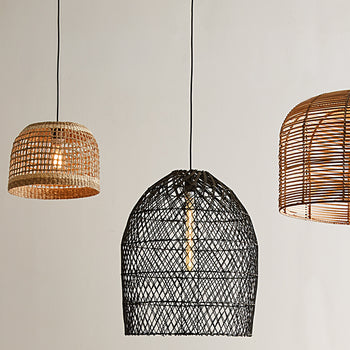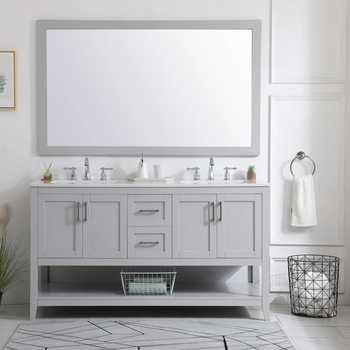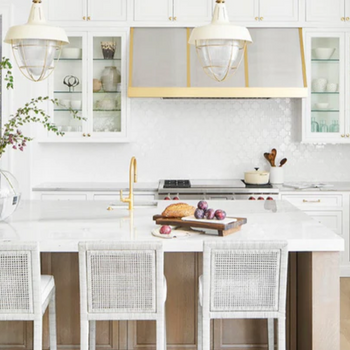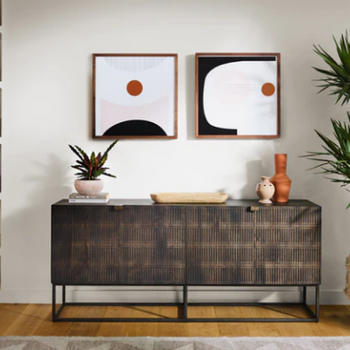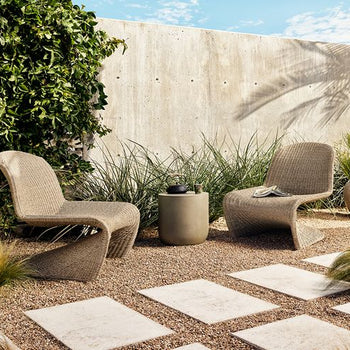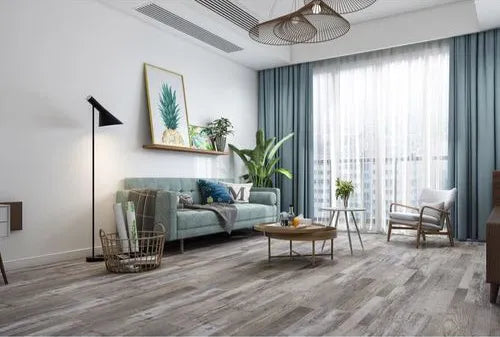Laminate vs Vinyl Flooring—Pros and Cons
By the Vevano Home Team
June 8, 2021
Every homeowner wants to choose the right flooring for every room, but there are many factors to consider. After all, your floor is one of the most significant and noticeable features in any room. You need to think about the style and color you prefer, but staying within your budget is just as important. That's why you should consider the pros and cons of laminate vs. vinyl flooring:
With laminate or vinyl floors, you can replicate the high-end looks of wood flooring for a fraction of the cost. You also benefit from floors that are highly durable. It can be challenging to choose between vinyl and laminate floors, so educating yourself is a smart move before you purchase and install new flooring. Equipped with that insight, you can feel confident about making the right laminate vs. vinyl flooring decision for your home.
What's The Difference Between Vinyl and Laminate Flooring?
While vinyl and laminate flooring are similar, there are some distinct differences. Both are affordable and available in many styles to complement your decor. Always consider the needs of your home and the use of the specific room you're upgrading when making your flooring choice.
As the first manufactured alternative to a wood floor, laminate flooring first gained popularity during the 1970s. Since then, laminate has been a top choice for homeowners who love the look of hardwood floors but don't want to spend significant money on flooring. Made from synthetic material, laminate flooring consists of an inner core with a decorative image on top, covered by a protective overlay.
Although laminate flooring is water-resistant, not all variants are 100 percent waterproof. As a result, long periods of exposure to water can damage some types of laminate floors. If you truly desire waterproof laminate, a few brands do offer this style of flooring at a higher cost than traditional laminate.
By contrast, vinyl floors consist of polymer materials that can withstand water. Plus, a vinyl floor may come in one large vinyl sheet without seams where water can seep through. Also made of layers with a printed layer and a protective wear layer, vinyl flooring is a durable choice for any floor. Although you can find a wide array of vinyl designs—including ones that mimic stone and ceramic tile—wood-look laminate tends to offer a more realistic, higher-quality appearance.
Since laminate and vinyl are similar in so many ways, it's helpful to evaluate the pros and cons of each flooring type. After review, you may find that one alternative is the clear choice for your room.
Laminate Flooring Pros
Durability and Affordability
When you purchase flooring, you want materials that will endure and stand up to the rigors of everyday life. Before you buy flooring, consider your lifestyle needs. Do you have a pet whose claws can damage the floor? Are you installing flooring in a high-traffic room, like a family room or kitchen?
The good news is that you can choose from various grades of laminate to meet the needs and use of your rooms. For low-traffic rooms, you can choose floors with an AC 1, while AC 2 or AC 3 are perfect for most other home applications. The highest grades of laminate flooring, AC 4 and AC 5, are ideal for high-traffic or heavy-use commercial settings.
You can rest assured that your laminate flooring will last for the long haul. But another benefit of laminate is that it's far more affordable than other flooring alternatives, such as solid hardwood. Thanks to the laminate manufacturing process, you can enjoy the look of engineered wood without a major home improvement expense.
Can Mimic the Look of Stone or Wood
For decades, homeowners have chosen laminate flooring for its ability to replicate the look of wood floors at a lower cost. While laminate was always an attractive alternative to wood, manufacturers have created dozens of new options that mimic popular species of wood used in home decor. You can find laminate flooring that resembles hickory, oak, chestnut, driftwood, pine, and more. Today's manufacturers can also create rustic and antique laminate styles that give your floor a well-worn look that complements the aesthetic of many older homes.
Stone is another natural material that has surged in popularity in home decor. You'll find stone floors in many settings, from urban lofts to farmhouse-style kitchens. Like real wood, stone flooring can be expensive to procure and install. But stone-look laminate is a lower-cost alternative that doesn't break the bank.
If real hardwood or stone flooring is not in your budget, laminate can give you the style you desire.
Easy to Clean
You can keep your laminate floors looking pristine with a regular cleaning regimen. For most homes, a weekly cleaning routine works well. However, you may need to clean more frequently if you spend a lot of time outdoors and track in dirt or sand often.
Sweep your laminate floors regularly and vacuum using a soft brush attachment once per week. You can also use the hard floor setting on your vacuum for laminate flooring. Every few months, perform a deep clean using a microfiber mop and products made for laminate floors.
While you can use a regular mop, make sure that you don't oversaturate because your laminate floor may not be waterproof. Although you never need to deep clean your laminate floors, you can spot clean minor spills. as needed with a microfiber cloth.
Laminate Flooring Cons
Hard Surface
Traditional laminate flooring has a very hard surface, which can make walking or standing on it for long periods uncomfortable. You can avoid this phenomenon, however, by choosing a laminate floor with a foam underlayer that provides a somewhat springy feel, similar to what luxury vinyl tile already offers.
Not Always Waterproof
As mentioned previously, laminate flooring is water-resistant, but may not be waterproof. For that reason, you should carefully consider the purpose of a room before installing laminate flooring. If there is a risk of your floor becoming saturated with water—even a very small one—you may not want to opt for laminate flooring. Alternatively, you can pay a bit more and install waterproof laminate flooring.
Vinyl Flooring Pros
Durability and Affordability
Many people opt for vinyl flooring because it is a cost-friendly option. Not only that, but vinyl flooring is extremely durable and can withstand years of wear and tear. You can expect a long life from any vinyl floors in your home.
Waterproof
One major benefit of vinyl is that it's made of layers of waterproof flooring material. The result is a waterproof floor that can stand up to heavy use without damage. Although you can use waterproof vinyl flooring in any room in your house, it is a great choice for laundry rooms, bathrooms, and kitchens.
Vinyl Flooring Cons
Difficult to Remove
Although installing vinyl is easy, you may find your vinyl floors difficult to remove if you want to go in a different decor direction later. Why is that the case? Many vinyl flooring options have a self-stick adhesive that allow easy do-it-yourself (DIY) installation. The glue used in vinyl flooring can be very sticky and require some work to remove. However, you can avoid this problem by choosing luxury vinyl tile (LVT). With LVT flooring, you get an easy-to-use, click-together tile that is much more flexible and forgiving than its adhesive-backed counterpart.
Requires Proper Care
Yes, vinyl flooring is extremely durable—as long as you care for it properly. If you use the wrong tools or cleaners, you could end up with unsightly scratches or marks on your floor. That's why you should avoid abrasive cleansers, scouring pads, detergents, or waxes that can harm your floor's surface. Instead, use a vacuum or dry mop to remove dust and dirt and mop with a commercial cleaner specifically designed for vinyl floors. As an alternative, you can add white vinegar to a gallon of water for extra shine.
Which Floor Is a Better Investment?
Now that you're familiar with the pros and cons of laminate vs. vinyl flooring you may wonder which choice is the better investment. As is the case with many of life's questions, the answer is "it depends."
Refer to the needs and use of the rooms you're redecorating as a guide for choosing the right flooring type. Keep in mind that each flooring option offers you durability at an affordable price, and you can find laminate and vinyl floors that faithfully replicate wood, stone, or tile. While laminate and vinyl are economical choices, they may not add as much value to your home as stone or hardwood flooring over the long term.
If you want the best wood-look alternative for a living area, hallway, or bedroom, laminate could be right for you. Because some laminate products offer less protection against water, you may not want to select it for a laundry room. Although some homeowners won't choose laminate for kitchens or bathrooms, laminate can work in those settings as long as you are diligent about cleaning up spills and protecting your floor from exposure to water or liquids. Choosing waterproof laminate eliminates the risk of water damage.
The biggest benefit of vinyl flooring is that it is waterproof. For rooms where exposure to water is common—like laundry rooms and bathrooms—vinyl flooring is a safe bet. You can find vinyl floors that look like popular tile, wood, and stone designs, so you don't have to sacrifice style for a durable, waterproof floor. Today's luxury vinyl flooring is comparable to laminate in appearance, so keep that in mind when making your decisions.
You may find yourself longing for high-end stone or hardwood flooring, but not have the budget for an expensive upgrade. Don't assume you are stuck with outdated floors. When you learn about laminate vs. vinyl flooring, you'll find that you can achieve the look you want and save money at the same time.
Although laminate and vinyl flooring are similar, you'll need to consider some tradeoffs when choosing flooring for your home. While many interior design aficionados assert that laminate is higher quality, you'll find that premium vinyl options offer similar appeal. The chief benefit of vinyl is that it is more waterproof, which means you can use it in rooms like bathrooms or laundry rooms. Keep in mind, however, that waterproof laminate options are available from select brands.
No matter whether you choose laminate vs. vinyl flooring, you can create an aesthetic you'll love for every room in your house. Some homeowners choose one flooring option for a cohesive look throughout their home, while others prefer a more eclectic look with different flooring choices for different rooms or floors. With the affordable and durable vinyl and laminate options in the marketplace today, you'll be certain to find one that meets your needs and style.
Spend some time reviewing room designs, curate some favorites, and emulate the look you love in your own home. And if you run into any questions during the process, Vevano Home is here to help!


